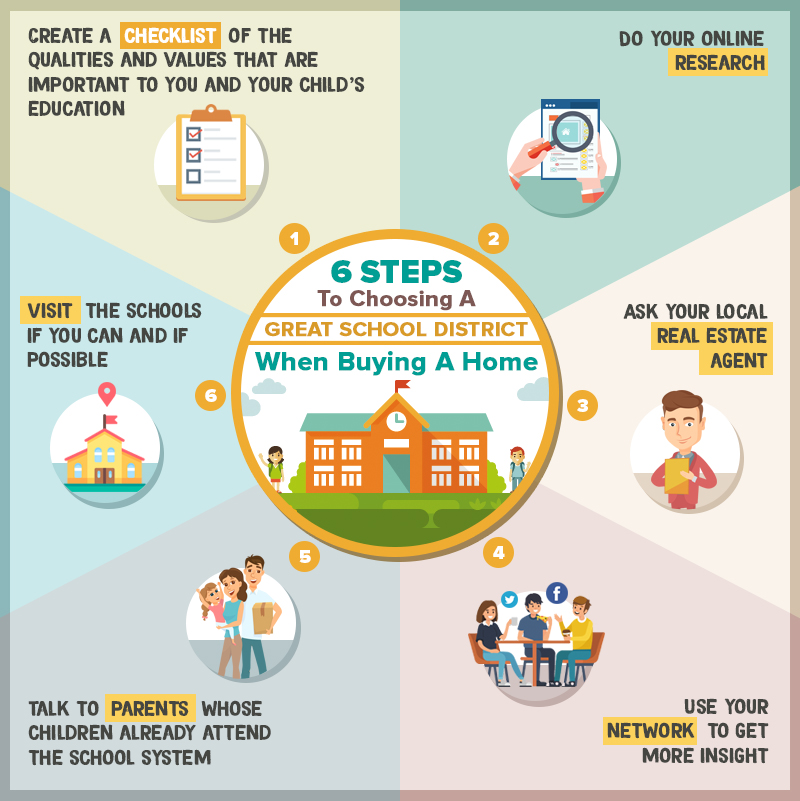According to the National Association of Realtor’s Schools and Home Buying Decision article, proximity to good quality schools is one of the most influential factors in a buyer’s decision when purchasing a home. It is a major factor especially for buyers with families or young couples who are planning to have children. Homes that are located near top-quality school districts usually translate into higher property values and generally have a huge resale potential. In the NAR 2015 Profile of Home Buyers and Sellers, 25% of home buyers listed school quality and 20% listed proximity to schools as the deciding factors in their home purchase. Many home buyers are even willing to forgo certain home amenities just to have access to quality schools.
As you do your house-hunting, it’s important to also have an analysis of the schools and school districts you’re considering. Here are some things you can do to help you choose an excellent school district wisely:
1. Create a checklist of the qualities and values that are important to you and your child’s education
If you consider a good school district as one of the major factors in your home-buying decision, contemplating about what values matter to you most when it comes to your child’s education is also relevant. A school will be your child’s second home, so you might want to be clear about your preferences. Do you prefer a traditional or an alternative style of learning? How important are extracurricular and skill enhancement activities to you and your child’s development? What are your child’s skills, strengths and weaknesses, and how can these be improved? What sort of contributions are you willing to make to improve your child’s learning? These are just some of the questions you have to ask yourself so you can be clear about the kind of school you want your children to be in.
2. Do your online research
Most schools and school districts have their respective websites where anyone can get extensive information. Spend some time checking the sites of each school you’re considering and read parent and local reviews. Also check out other resources that provide valuable information, such as GreatSchools, NeighborhoodScout, the National Center for Education Statistics, and others. Take time reading downloadable school newsletters and calendars to familiarize yourself with the local news and events. It is also worth looking at some of the following information:
-
Standardized test scores
-
The curriculum being offered
-
The latest rate of students attending higher education
-
Awards and certifications the school has recently received
-
Student-to-teacher ratio
-
The educational attainment of most teachers
-
Languages offered; and
-
Any specialized programs for gifted or needy students
3. Ask your local real estate agent
Your experienced local real estate agent can be one of your best resources in knowing the local market. He/She should have a good understanding of which school districts are top-quality and which are less desirable and could provide you with an objective opinion of the schools. Consider your realtor’s recommendations, and then verify other information you gathered before weighing the pros and cons.
4. Use your network to get more insight
Whether you’re searching for a new home in the next street or heading into a completely new neighborhood, your network of family and friends could be helpful in your quest to finding a good school district. They may have some knowledge of a particular school district that you still don’t know about, or they may also have encountered that school you’re considering during their house-hunting.
Either way, you can reach out to those people you know (and trust) and ask for their advice about a particular area and school. You may also utilize your social media accounts by posting on Facebook and on trusted community groups and pages to find out if people have any experience or insight to share. It will be worthwhile if one of your networks has a friend who’s a teacher or a school staff member who can give you an insider’s perspective, which could be more valuable than online information. At the end of day, it wouldn’t hurt to ask!
5. Talk to parents whose children already attend the school system
You may have done your online research about particular schools and their reputation, but hearing the personal experience of local parents whose children already attend the school system is more valuable. Speaking to them can give you a general understanding of what it is really like learning from a specific school, and whether their children attend any great after-school programs or individualized education programs that will also be beneficial for your children.
6. Visit the schools if you can and if possible
There’s no such thing as going “overboard” when you really want to find a good school district that will benefit your children’s education and the potential resale value of your property. After performing your research, narrow down your top choices and visit the schools in person to better evaluate each school. You can see for yourself how the schools operate and the interactions taking place. If you’re from miles away, call and ask permission first before visiting as some schools may have certain restrictions. See the classrooms and common areas and get a feel of the school’s culture and values through observing its people and surroundings.

